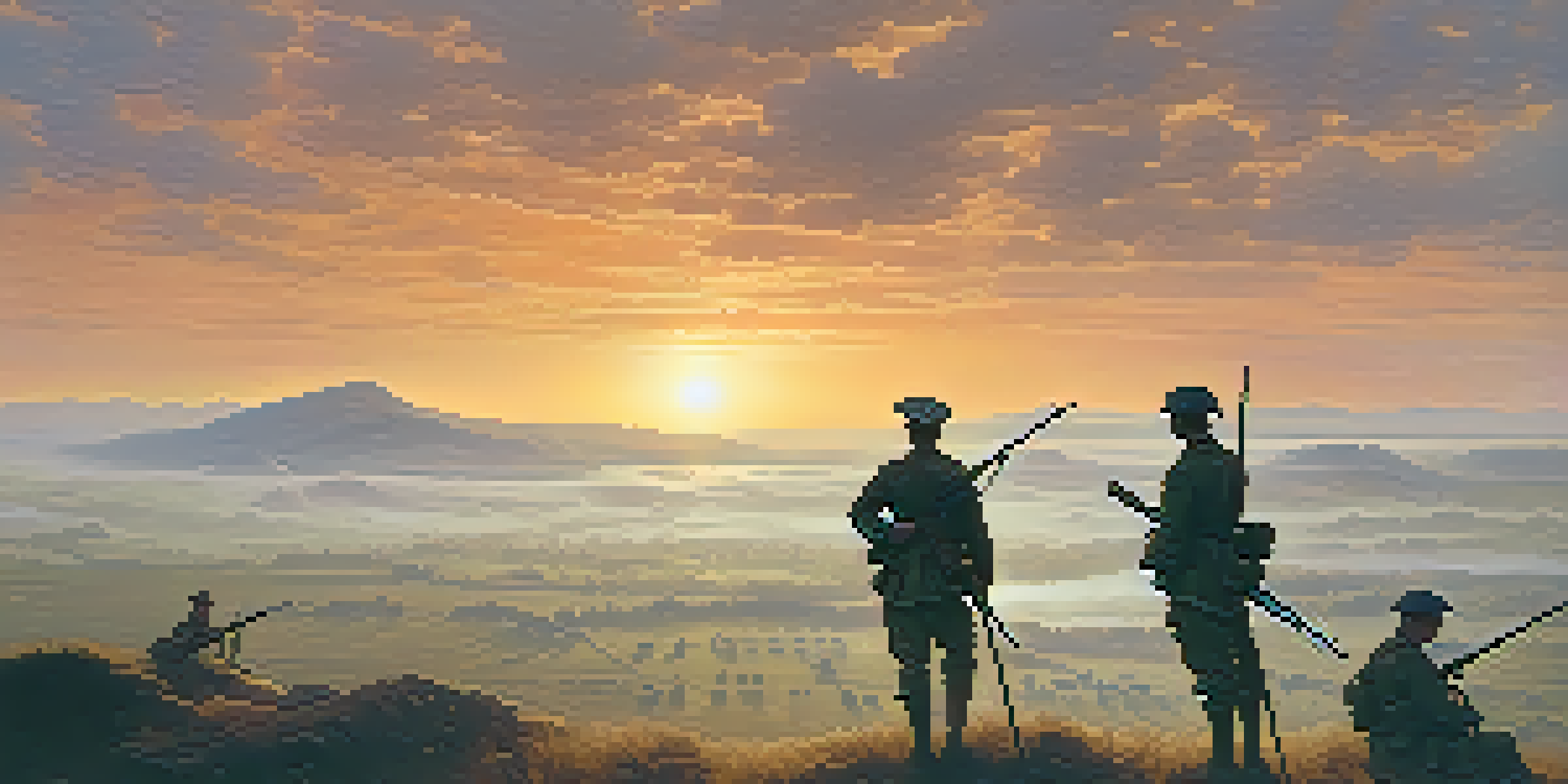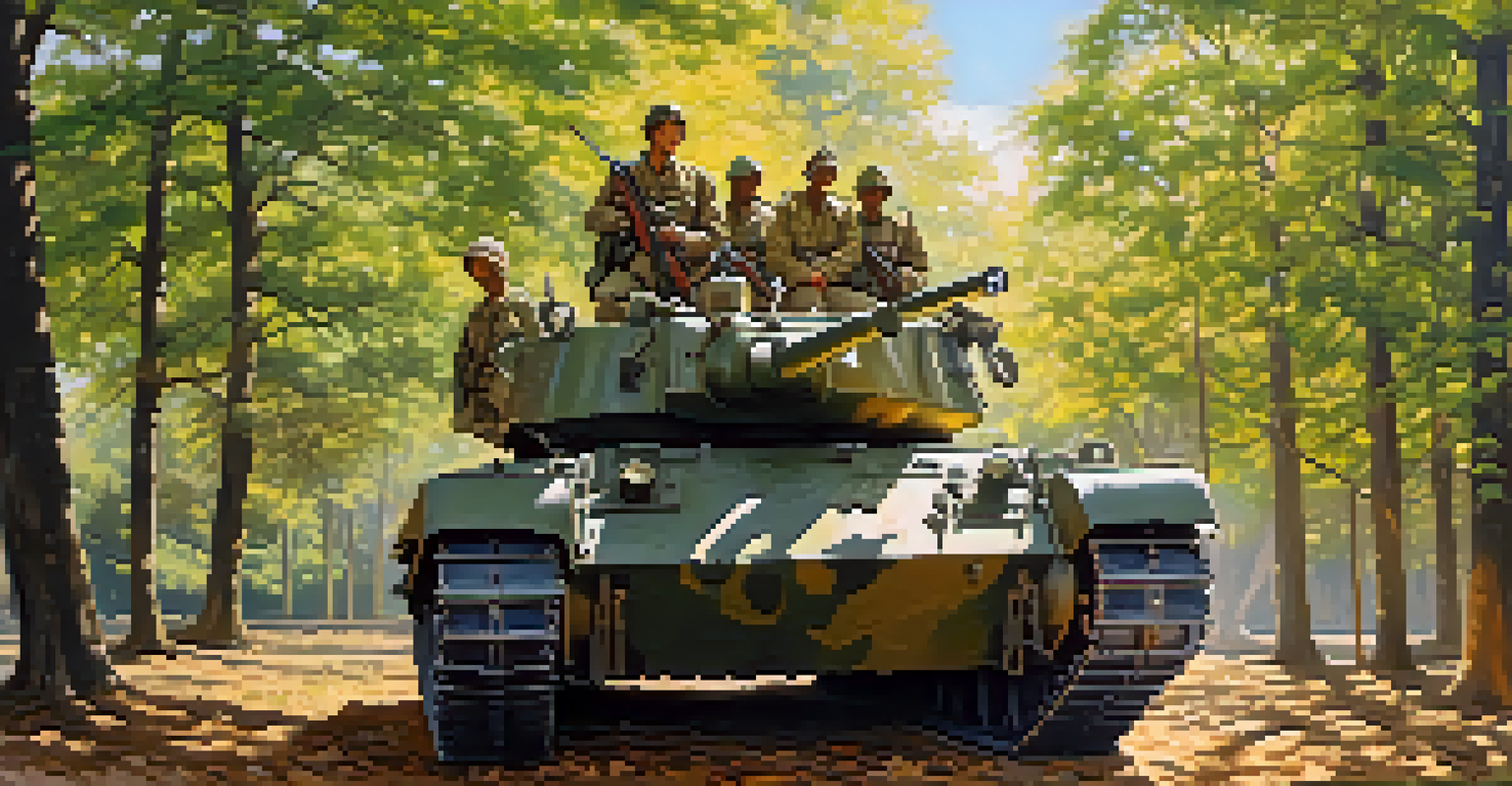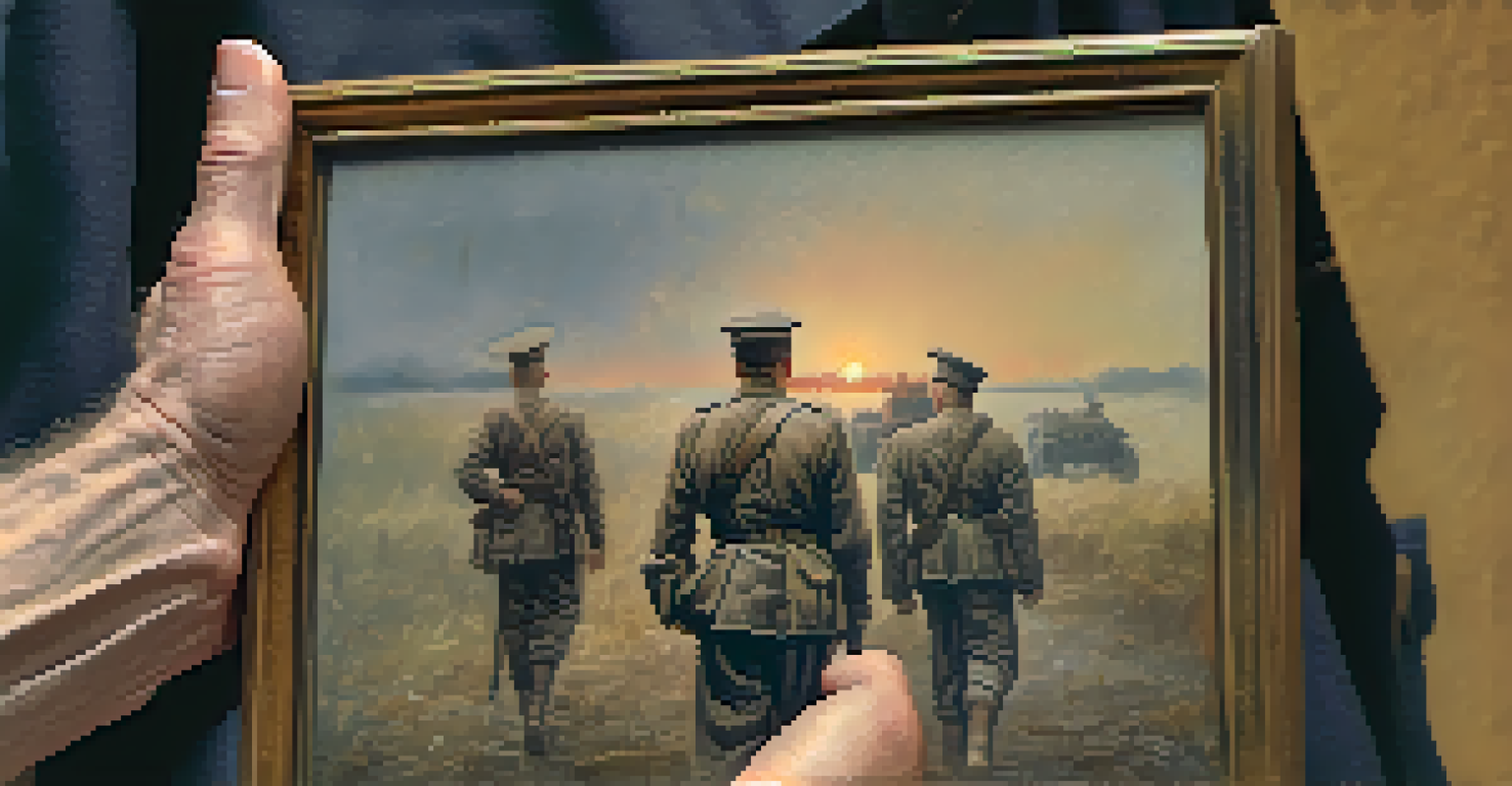Hollywood's Influence on the Perception of World War II Events

The Golden Age of War Films and Their Impact
During the Golden Age of Hollywood, films like 'Casablanca' and 'Saving Private Ryan' became cultural touchstones, illustrating the heroism and tragedy of World War II. These movies often shaped public sentiment, turning complex historical events into digestible narratives that highlighted bravery and sacrifice. The emotional weight of these films not only entertained audiences but also influenced their perceptions of the war's morality and significance.
The past is never dead. It's not even past.
Hollywood's storytelling prowess allowed filmmakers to frame the narrative around World War II, often emphasizing themes of good versus evil. This simplified portrayal can create a skewed understanding of the war, as it tends to overlook the nuanced realities faced by soldiers and civilians alike. In many cases, the black-and-white moral landscape presented in these films contrasts sharply with the shades of gray that characterize actual historical events.
As viewers absorbed these dramatized versions of history, Hollywood effectively became a lens through which the public understood World War II. The emotional connection fostered by compelling characters and gripping plots often overshadowed the more complex truths of warfare. This artistic interpretation can lead to a collective memory that may not fully align with the historical facts.
The Role of Propaganda in War-Time Cinema
During World War II, Hollywood played a crucial role in supporting the war effort through propaganda films. These films aimed to boost morale, encourage enlistment, and promote unity among the American public. Movies like 'Why We Fight' were crafted to inform and motivate citizens, framing the conflict as a noble battle for freedom and democracy.

The use of propaganda in film not only served immediate war-time goals but also shaped long-term perceptions of the conflict. By presenting a simplified narrative that glorified the Allied forces while vilifying the Axis powers, filmmakers influenced how generations understood World War II. This has led to a lasting legacy where certain aspects of the war are romanticized or simplified for easier consumption.
Hollywood Shapes War Perceptions
War films create emotional narratives that influence public understanding of World War II, often oversimplifying complex realities.
While propaganda can be an effective tool for rallying support, it also raises ethical questions about the truthfulness of such portrayals. The challenge lies in balancing the need for inspiration against the responsibility to convey accurate history. As a result, many viewers may find themselves with a skewed understanding of the complexities of war.
Diverse Perspectives: The Representation of Different Nations
Hollywood's portrayal of World War II has often centered on American experiences, sometimes neglecting the diverse perspectives of other nations involved in the conflict. Films like 'The Bridge on the River Kwai' and 'The Pianist' attempt to provide alternative viewpoints, yet they can sometimes fall short of fully representing the cultural and historical richness of those narratives. This selective storytelling can create a distorted perception of the war's global impact.
History is written by the victors.
When certain countries and experiences are marginalized or overlooked, audiences may develop a limited understanding of the war's complexity. For instance, the horrors faced by civilians and soldiers in Europe, Asia, and the Pacific are often simplified or omitted entirely. This lack of representation can lead to a narrow view of who the heroes and villains are, ultimately influencing public perception in significant ways.
As global audiences consume these films, it's essential to consider the broader implications of such representations. The challenge for filmmakers is to tell inclusive stories that honor the full spectrum of experiences during World War II. By doing so, Hollywood can contribute to a more nuanced understanding of this pivotal moment in history.
The Myth of the 'Greatest Generation'
The term 'Greatest Generation' refers to those who lived through the Great Depression and fought in World War II, a notion that has been popularized by films and documentaries. This label, while celebrating the resilience and bravery of these individuals, can also oversimplify the diverse experiences of the era. It often overlooks the struggles faced by those who were not on the front lines, including women, minorities, and even those who opposed the war.
Hollywood's glorification of this generation can lead to unrealistic expectations of heroism and sacrifice. By focusing primarily on the valor of soldiers, the complex realities of everyday life during the war can be overshadowed. This narrative risks alienating those who contributed to the war effort in non-combat roles, as well as those whose stories have gone unrecognized.
Diverse Perspectives Are Overlooked
Hollywood frequently centers American experiences, neglecting the diverse narratives of other nations involved in World War II.
Ultimately, it's essential to acknowledge the multifaceted nature of the contributions made during World War II. By broadening the narrative, Hollywood can help create a more inclusive understanding of this crucial period in history, allowing future generations to appreciate the varied experiences that defined the era.
Post-War Cinema and the Reflection of Changing Attitudes
Following World War II, Hollywood shifted its focus to reflect the changing attitudes of society. Films like 'The Best Years of Our Lives' explored the challenges faced by veterans returning home, highlighting issues such as PTSD and the difficulty of reintegration. This shift marked a departure from the glorified narratives of heroism, allowing for a more nuanced exploration of the war's aftermath.
As societal views evolved, so too did the portrayal of World War II in cinema. The emergence of anti-war sentiments during the Vietnam War era led filmmakers to re-examine the morality of conflict and its impact on those who fought. Movies began to question the righteousness of war, providing audiences with a more complex understanding of its consequences.
This evolution in storytelling continues to influence how contemporary filmmakers approach World War II narratives. By tackling difficult themes and portraying the emotional toll of war, modern cinema can foster a deeper empathy and understanding among audiences. This ongoing dialogue between past and present allows for a richer exploration of history.
The Rise of Documentaries and Historical Accuracy
In recent years, documentaries have gained prominence as a medium for exploring World War II events with greater historical accuracy. Films like 'The World at War' and Ken Burns' 'The War' provide in-depth examinations of the conflict, drawing on firsthand accounts and archival footage. This approach allows for a more authentic representation of history, challenging the dramatized narratives often found in traditional films.
Documentaries serve as a valuable resource for educating audiences about the complexities of World War II, presenting multiple perspectives and lesser-known stories. By focusing on real experiences, these films can demystify the war and encourage viewers to engage with its historical significance. This shift toward factual storytelling can help counterbalance the idealized portrayals commonly seen in Hollywood narratives.
Documentaries Enhance Historical Accuracy
Recent documentaries provide in-depth examinations of World War II, offering more authentic representations compared to traditional films.
However, even documentaries are not immune to interpretation and bias. Filmmakers must remain vigilant in their efforts to present accurate representations of history while also crafting engaging narratives. The challenge lies in balancing the need for storytelling with the responsibility to honor the truth of the past.
The Ongoing Legacy of Hollywood's WWII Portrayals
The influence of Hollywood on the perception of World War II continues to resonate today, as new generations engage with these narratives through film and television. As cultural touchstones, these stories shape collective memory, influencing how we view not just the war, but also the values and lessons derived from it. This legacy can be seen in the ongoing popularity of war films and documentaries, which consistently draw audiences.
Moreover, the portrayal of World War II in popular culture can serve as a reflection of current societal values and concerns. As filmmakers tackle contemporary issues such as nationalism, heroism, and moral ambiguity, they often draw parallels to the past, allowing audiences to connect historical events with modern-day dilemmas. This ongoing dialogue keeps the narrative alive and relevant in today's world.

Ultimately, the responsibility lies with filmmakers to approach these stories with care and sensitivity. By honoring the complexities of history and the diverse experiences of those who lived through World War II, Hollywood can continue to play a significant role in shaping our understanding of the past. As we reflect on these narratives, we can foster a deeper appreciation for the lessons they impart.